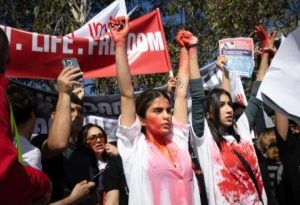Iranian diaspora rally to support human rights protests
The death of a young woman who fell foul of Iran’s draconian dress code has ignited protests by Iranians and their supporters around the globe.
Marches and protests have been held in dozens of cities, including Melbourne, demanding an end to human rights abuses in Iran
Mahsa Amini, a 22 year old woman from Kurdistan who travelled to Tehran with her family, was held in the Morality Police’s detention centre after she was arrested for not adhering to Iran’s strict Islamic dress code.
Ms Amini was detained for improperly covering her hair. While in police custody, she fell into a coma from which she did not awaken. She was rushed to the hospital and was declared brain dead after a day.
Her family has challenged official accounts of Ms Amini’s death and alleged that she was beaten by authorities and recent reports on her death have included similar testimony from witnesses to her arrest.
Thousands of Iranians have taken to streets over the last two weeks to protest against the obligations of Hijab, and the dictatorship that has been ruling Iran over the past 44 years.
Among the first reports detailing Ms Amini’s death was one by Niloufar Hamedi, a female reporter for the Tehran based newspaper Sharagh.
 On the day of Ms Amini’s death, Ms Hamedi shared a photo of members of Ms Amini’s family embracing in the hospital which was widely circulated.
On the day of Ms Amini’s death, Ms Hamedi shared a photo of members of Ms Amini’s family embracing in the hospital which was widely circulated.
The following day, September 17, protesters at Ms Amini’s funeral in her hometown of Saqez, were attacked by soldiers.
Protests quickly spread from Iran’s Kurdish regions throughout the country, fuelled, according to reports, by a range of grievances including a collapsing economy, corruption, civil repression and social restrictions.
A few days later agents from Iran’s Ministry of Information raided Ms Hamedi’s home, confiscated her laptop and phone, and arrested her. Her Twitter account was suspended.
Melbourne Iranian community member Nikeh Shariatian says Mahsa’s death has inflamed the Iranian people’s anger against the country’s Islamic government.
“Thousands of Iranians have taken to streets over the last two weeks to protest against the obligations of Hijab, and the dictatorship that has been ruling Iran over the past 44 years,” Ms Shariatian said.
“They have experienced brutality, violence, killing and imprisonment at the hands of the Ayatolah’s troops. On 2nd of October 2022, at a well-known university in Tehran, The Sharif University, students were held and tortured and detained in their dormitory. We are still unsure of the number of deaths from this seige,” she said.
People from across the world have joined Iranians in rallies to support the uprising against the Islamic Government.
In Melbourne, thousands of people gathered at Federation Square last Saturday to protest.
“The people of Iran, irrespective of religion and ethnicity, demand their basic human rights such as women rights, freedom of speech and religion, gender equality and LGBTIQ rights an d animal rights,” Ms Shariatian said.
“All Iranians are now undergoing very difficult times and we really appreciate all of the support we get in these days.
“We want regime change in Iran and we want the Australian Government to deport Iranian diplomats and stand by people of Iran,” she said.
Mr Shariatian said more protests were planned for Melbourne and across the world.
“We want to support the people, and especially the women, of Iran. This has become a big movement and there are a lot of protests going on in Iran and a lot of women are taking to the streets,” she said.
“We need to support these people because there is violence on the streets being carried by government troops.”
Ms Shariatian said it was difficult to communicate with people inside Iran and the government was in control of most of the media.
“The internet is down and there are no foreign correspondents allowed in Iran. So people are using their phone cameras to show what is happening there,” she said.
This is not the first time Iran’s government has launched a deadly crackdown on dissent.
In November 2019, after the Iranian government announced a sharp increase in petrol prices, protests took place across the country with security forces killing more than 300 people, according to Amnesty International.
The government also implemented an internet blackout said to be the largest in the country’s history.












